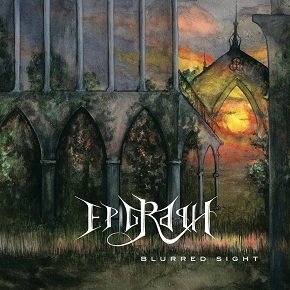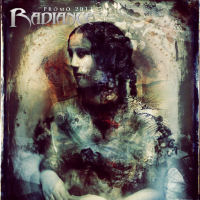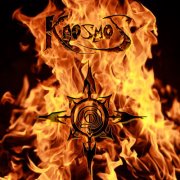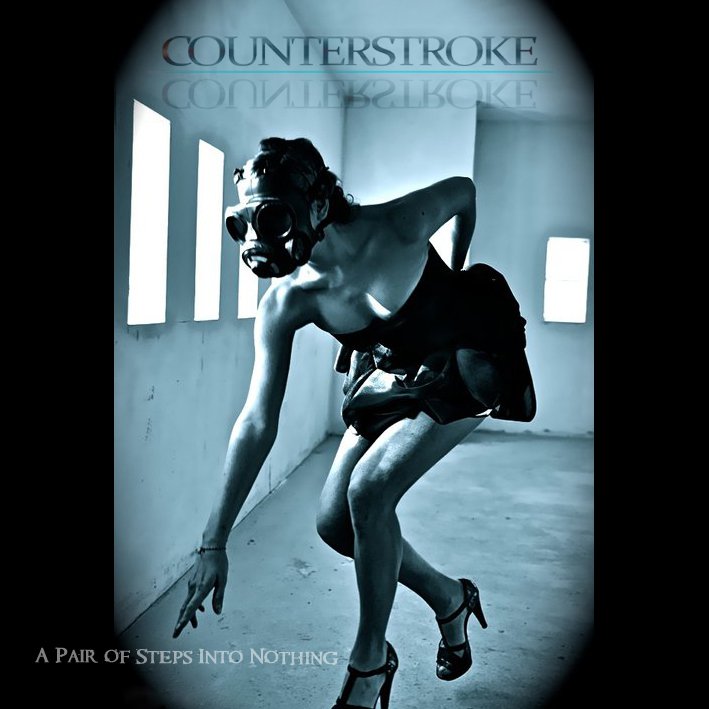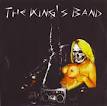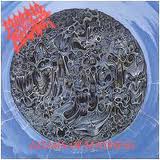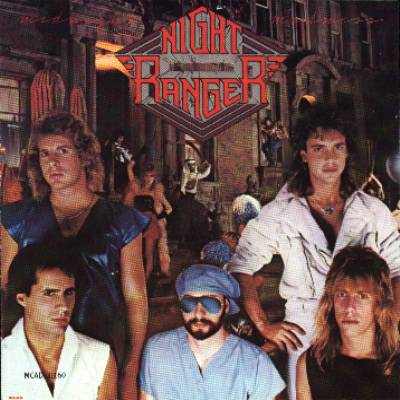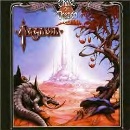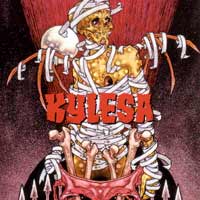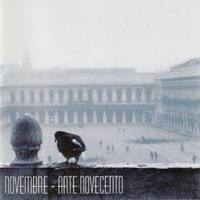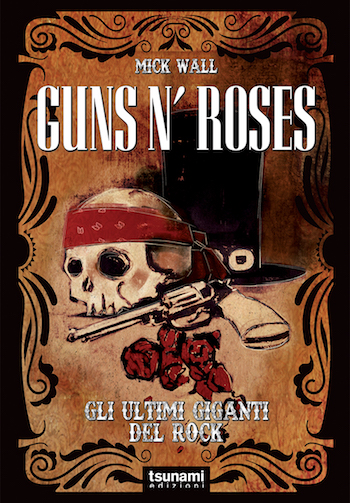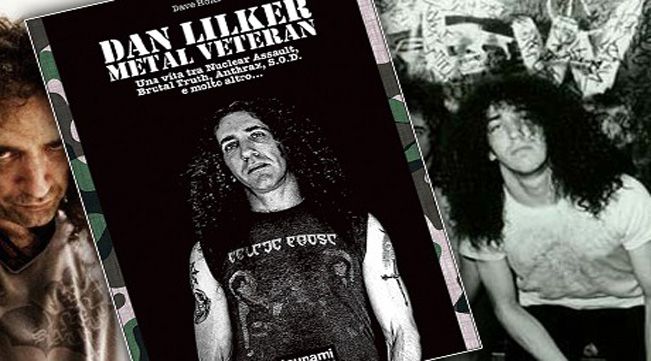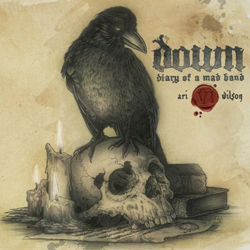Black Crucifixion
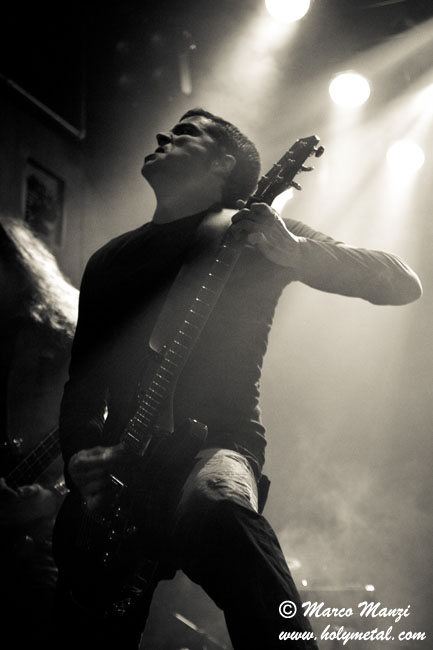
Line up:
E. Henrik - Bass
Markus E.R. Kill - Guitars
V.S. Scorpius - Drums
Black Crucifixion is one of the very first Black Metal bands in the Finnish scene, and as the guys now are celebrating the goal of their 20th
anniversary with a serie of live appearences in clubs and festivals all over the country, after the release of their new "Hope Of Retaliation", we
get the chance to interview the singer Forn about the band, its origins, and much more:
Marco: So, the concert at Tuska came almost precisely 20 years after the band did its first live appearence, right? Why don’t you begin with telling
us how Black Crucifixion started? And did you think about any of this during that show?
Forn: You’re absolutely right. The beginning of BC in the summer of 1991 was preceeded with a band I had with two other guys, the name was Mortal
Christ, that I had started in 1990 about the same time I started working the first issue of my Fallen Pages zine... But by the summer 1991 that pre-
BC band had already faded without, leaving behind anything but one simple rehearsal room recording. It was pretty much just an experiment on how to
be in a band, and as the other members were not into the type of music that I found inspiring (Tiamat, Samael, Rotting Christ, Sodom, Venom, Carcass,
Possessed, Blasphemy, Sarcofago, Hellhammer, to name a few) it was time to look for new partners in crime.
My childhood friend Blacksoul had bought a guitar (from me actually), so we started writing songs as the second issue of Fallen Pages was ready after
a huge workload. There were not too many black metal drummers around in the world those days, let alone in the desolate town of Rovaniemi, so it was
natural to ask Beherit’s Sodomatic Slaughter to join in, as he lived very close to our houses as well. This trio was then completed with Wennström
The Black Christ of Third Desolation who had previously played bass in Beherit and had not yet started his own band Parade of Souls. He only played
with us on the debut gig in August 1991 which is now out on CD together with the The Fallen One of Flames demo/minialbum that we recorded as a trio
later that year.
This years Tuska appearence had a special meaning for us in the anniversary-sense. But the most special show this year was the first one we played in
May in our original hometown of Rovaniemi, where we had never performed live. Blacksoul, who left the band after the Promethean Gift mini-album,
joined us on stage to play the anthemic Flowing Downwards track from The Fallen One of Flames. That pre- and after show party was the most nostalgic.
At Tuska it was more about the contemporary Black Crucifixion packing as much energy into the 30 minutes slot as possible. But yeah, it was good to
get on stage after the celebrity announcer of the Tuska Open Air mainstage had run all the way to the smallest stage just to announce us in, as he
wanted to show his appreciation to the band. It was never about the amount of fans, but the quality of them. That is what makes our kind of left-
field approach to the music industry possible. We manage to stay outside and can pop in whenever we feel like it. Even if there’s a ten years silence
in between.
M: Your fans sure showed their appreciation for having you back! But from what you say, and given the location it’s understandable, it looks like it
wasn’t really easy to get a band started back in the days. What has changed after 20 years in the scene in your opinion? Do you still recognize
yourself in this music world or it has become something distant from your original ideas?
Also, you got me curious now. Can you tell me a little more about this Fallen Pages?
F: Starting the band had a lot to do with the fact that there was not much to do those days for young men in our area of far north Finland. The
town was very much about sports which I was not into. So when there are young men with ambitions and little to do, in some cultures and eras that
means war. But in 1991 it meant starting a band. The most difficult part was getting a proper gear for the band but we managed.
But a huge difference is that as we played our first Rovaniemi show this spring in 2011 we had a pre-show warm up rehearsal at the place which the
gig organizer has for his own bands, and we have to say our jaws dropped when we stepped into the facility. Our bass player E. Henrik put it to
words: Those young students had a massive practice installation familiar from old "Metallica makes a record"-type of videos, with walls of amps and
several high quality drum kits, and a living room in a 80 square meter space that they could use any time they wanted. Something that the standards
of living twenty years ago would never have allowed for small local bands. So yeah, there definitely is a change in the surroundings for creativity
with internet and software recording, combined with the amount of money that modern kids at least up here have as a resource. But we don’t envy any
of these newcomers as they have to struggle with the amazing amount of other bands around. When we started the bands were so few, but for some reason
the quality was very good. One could roughly say that every fifth of the demos I heard at the time made some sense. For example an Italian band
called Sinoath had a very good demo out in 1992 even though I never heard of them since. I bet they did not have very much of a rehearsal studio or
luxurious equipment but a spark of creativity and taste. That is what matters still.
The better resource for Fallen Pages is this excellent article about the zine scene of 90’s written by a Finnish guy:
http://www.deathmetal.org/death_metal/music/zinearticle.html
M: Thank you for pointing to the link about those underground zines. I think it’s pretty interesting to see how people with such passion for music
could find the resources and time to create such work.
F: We were young...
M: But you’ve been talking about creativity and ability to make good music... what is it that has inspired you and that still inspires you in your
music? (not only in the composition but in the lyrics as well)
F: Inspiration for our music and the lyrics comes from many sources, but definitely not from metal music - let alone other black metal bands. It
has been amusing to see reviewers claiming they hear this and that band as an influence on Hope of Retaliation, as the inspiration most often comes
from nature (I go hiking whenever I can), from experiences in life, from books and movies. Nowadays even more from playing a 3D shooter on Xbox than
from some Norwegian band. As said, we don’t listen to other bands for inspiration and I have hardly even heard of many of these bands that modern BC
has been compared to. My songwriter companion E. Henrik goes as far as having a motto that he "hates heavy metal", which I can believe as couple of
years ago he rejected my suggestion to buy a Mastodon album for it being "heavy metal". So no wonder reviewers often have a hardtime describing our
output.
M: Well, you sure are in the right place if you like nature, while lots of Finnish people always (maybe jokingly) complains that there’s nothing in
here, I think you are really lucky in that sense. But let’s talk now about this Hope Of Retaliation, I mean, you haven’t been very productive
release-wise in your career, but as they say, quality over quantity, right? So are you satisfied with it, and with how it’s been received so far?
Also, any comment about the division between new songs, and the live version of older material? I think, correct me if I’m wrong, that here you
wanted to give more an idea of what kind of band BC is as a whole, not only in studio, but also show that sort of "gig feeling".
F: The response for the album has been very good. Except for Germany, where the majority of the reviewers have been less than luke-warm. Some
really "to the point" reviews have been released there as well, but most are amazingly bad. The promotion company, a German one, offered only one
explanation: The poor writers do not understand enough English to get the point of the album explained in the promotional material.
Elsewhere the reviews have been good, and so is the feed back from fans. Especially up here on our home grounds we do not have to read moron
comparisons to bands who came after us, written by 20 year old German baffoons.
The division between the studio and live has two reasons: firstly we wanted to offer an affordable way for new generations to get to know the band.
Also, we wanted a good quality release to celebrate the 20th anniversary and to demonstrate the power the band now holds, and how good the old
classic songs sound now. One factor is also that labels can not afford to pay for the high quality record production that we want to do, so we sued
the budget as well as we could to produce the four studio tracks. If people buy that there will surely be resources to records new material. But as
you pointed, we would never release a song that would not meet the quality demands we hold for ourselves. Rather do a handful of really well executed
songs than ten bad or mediocre ones. The music has to be able to stand the test of 20 more years. We know how to do that and act accordingly.
M: It seems strange to hear that you got that kind of feedback from Germany, that supposedly should be the "center" of the heavy metal world for the
importance of their market, festivals, labels, etc.
F: It reallys seems like they can’t read the promo, or they have some other cultural weirdness that prevents them from getting the point. Two very
good reviews (4/5 points) have been published, but otherwise it has been horrible. Also for the FoF re-release. Those (kids) just don’t know the band
or appreciate the music. Weird as there have been 5/5 reviews for the FoF in other countries...
M: And I didn’t consider the one reason for the format of HoR could be due to the budget constraints. It must be hard nowadays to be able to get
exactly what you want and how you want it to produce a new record. What do you think of the current situation in this sense?
F: Well, it of course sucks artistically as it constraints us from working on our music. When we started the labels were sparse, but it was
possible for them to invest in quality. Now it is more bands working in bedrooms trying to record and mix everything themselves, and then other
people downloading these C-class works for free online. We don’t want to do that.
M: As for the promotion, what’s in your opinion the best way to get people to actually buy your cds? In this sense internet is always tricky somehow,
cause there’s often ways to get to listen to the songs online for free, and not all people tend to reason in terms of "hey, this album sounds cool,
I’m going to buy it!".
F: Well, some kids are already living in a world where they never bought a single album. For a band like us it is not so bad as there are people
whoo appreciate the heritage and the feel of real records. I personally listen to music online and download it, but I also then buy the good ones and
scrap the bad. I don’t really feel bad about some Bryan Ferry MP3’s I might have had at some point but I certainly like to pay for the small
releases, like basically any local artists release, be it mainstream or underground. So I urge BC fans to get also physical copies of all our albums.
They are worth the Euros and are not made for the money but for the art. The record companies need the Euros to keep them available.
M: Now instead that you are still celebrating your 20th anniversary with all these live shows (you are playing again in Helsinki for example on Sept.
1st and at Metalheim festival), what do you enjoy the most of the live aspect? And what has changed, if anything, through the years?
F: We have really become an active live band in the last two years. It is very easy to enjoy the live situation, and of course it is, as otherwise
we would not be doing it. We are not one of those bands who play live because they have to or feel that it is mandatory, but because it is a sort of
ritual together with the people in the audience. It is about art but in a kind of a battle-mode when compared to ours that can be more atmospheric in
their approach. There isn’t money in the underground club scene, so in order to play the gigs we have to be able to get them our own way. And I don’t
understand bands that don’t give their all on stage. Why travel and wait for 23 hours just to feel miserable for the time on stage? My guess is that
many black metal musicians are just plain shy fucks, not matter how much they sing about Satan and massacre.
M: Yeah, sadly there’s always some bands out there which believe their image counts more than the music. But those shouldn’t normally last much. So,
I think we can wrap this up with your thoughts about the current Finnish metal scene. Also, what plans lie ahead for Black Crucifixion?
F: The Finnish scene has both quality and quantity. Of course it is very hard for new bands to find an audience. But love for the music in itself
is luckily a good reward, and if one does not have it, then who the fuck should care about their music anyway. For all Italians reading the great
media that is Holymetal.com I strongly suggest you guys go and get Hope of Retaliation. It has been called "black metal for people who like music"
and I have to agree with that statement.
As for plans for the future, we are going to celebrate our 40th anniversary. And meanwhile something good will happen. Maybe we will even play in
Italy one day.
M: Alright, thanks for the interview then!
F: Thanks to you!
Archivio Foto
Recensioni demo
Siamo alla ricerca di un nuovo addetto per la sezione DEMO, gli interessati possono contattare lo staff di Holy Metal, nel frattempo la sezione demo rimane temporaneamente chiusa.



